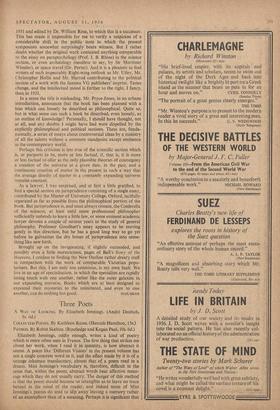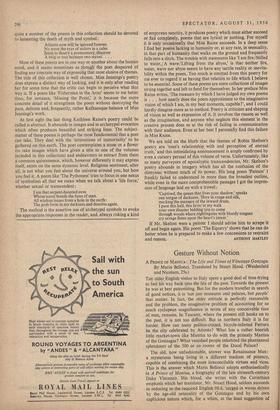'Three . Poets A WAv OF LOOKINCj. By Elizabeth Jennings. (Andre
Deutsch, Ss, 6d.) Elizabeth Jennings, oddly enough, writes a kind of poetry which is more often seen in France. The first thing that strikes me about her work, when 1 read it in quantity, is how abstract it seems. A poem like 'Different Visions' in the present volume has not a single concrete word in it, and the effect made by it is of a strange inhuman translucency, almost that of a poem read in a dream. Miss Jennings's vocabulary is, therefore, difficult in the sense that, within the poem, abstract words bear affective mean- ings which they do not usually carry. The danger of this method is that the poem should become so intangible as to leave no trace behind in the mind of the reader, and indeed some of Miss Jennings's poems do tend to slip awaY leaving a memory rather of an atmosphere than of a meaning. Perhaps it is significant that
quite a number of the poems in this collection should be devoted to lamenting the death of myth and symbol :
Atlantis now will be ignored forever. No more the eyes of sailors in a calm Seem to descry a promontory, discover A twig or tree between two waves. . . .
Most of these poems are in one way or another about the human mind, and it seems sometimes as though the poet despaired of finding any concrete way of expressing that most elusive of themes.
The title of this collection is well chosen. Miss Jennings's poetry does express a distinct way of looking, and it is only after reading her for some time that the critic can begin to perceive what that way is. If a poem like 'Fisherman in the Arno' seems to me better than, for instance, 'Missing the Point,' it is because the more concrete detail of it strengthens the poem without destroying the pure, delicate and, frequently, rather Kafkaesque balance of Miss Jennings's work.
At first sight the last thing Kathleen Raine's poetry could be called is abstract. It abounds in images and in archetypal evocation which often produces beautiful and striking lines. The subject- matter of these poems is perhaps the most fundamental that a poet can take. They deal with the 'intimations of immortality' to be gathered on this earth. The poet contemplates a stone or a flower (to take images which have given a title to one of the volumes included in this collection) and endeavours to extract from them a common quintessence, which, however differently it may express itself, exists on the same dynamic level. Religious sentiment, after all, is not what you feel about the universe around you, but how you feel it. A poem like 'The Pythoness' tries to focus in one nexus of symbolism all that we mean when we talk about a 'life force,' whether sexual or transcendent :
I am that serpent-haunted cave Whose navel breeds the fates of men.
All wisdom issues from a hole in the earth:
The gods form in my darkness and dissolve again.
The method is the assertive use of archetypal symbols to evoke the appropriate responses in the reader, and, always risking a kind of empyrean sanctity, it produces poetry which must either succeed or fail completely, poems that are lyrical or nothing. For myself it is only occasionally that Miss Raine succeeds. In a deep sense I find her poems lacking in humanity or, at any rate, in sensuality, in that part of humanity that walks on the ground and frequently falls into a ditch. The trouble with statements like 'I am fire/Stilled to water,/ A wave/Lifting from the abyss,' is that neither fire, water, wave nor abyss seems to have any tactile reality or inevita- bility within the poem. Too much is omitted from this poetry for
me ever to regard it as having that relation to life which I believe to be essential. Some of these poems are mere collections of images strung together and left to fend for themselves. In her preface Miss
Raine writes, The measure by which I have judged my own poems is . . . how nearly does the poem approximate to the imaginative
vision of which I am, in my best moments, capable?', and I could
hardly disagree more as to method. Poetry is criticism and shaping of vision as well as expression of it. It involves the reason as well as the imagination, and anyone who neglects this element in the creative process does so at the risk of failing in communication with their audience. Even at her best I personally find this failure in Miss Raine.
We are told on the blurb that the themes of Robin Skelton's poetry are `man's relationship with and perception of eternal truth,' and this intimidating announcement is amply confirmed by even a cursory perusal of this volume of verse. Unfortunately, like so many purveyors of apocalyptic transcendencies, Mr. Skelton's poetry abounds in imagery which has all the confusion of the dionysiac without much of its power. His long poem 'Patmos' I frankly failed to understand in more than the broadest outline, while even in the more comprehensible passages I got the impres- sion of language laid on with a trowel: 'Captived, the queen that lives your shadow,' speaks one tongue of darkness. 'Here in rouge and silk, marking the measure of the inward drum, 1 pace this hall, this fever in my walk your own disaster bidding you to come through woods where nightingales with bloody tongues cry savage flutes upon the heart's intent.'
If Mr. Skelton were a painter I should advise him to scrape• it off and begin again. His poem 'The Equerry' shows that he can do better when he is prepared to make a few concessions to restraint and reason. ANTHONY HARTLEY



































 Previous page
Previous page